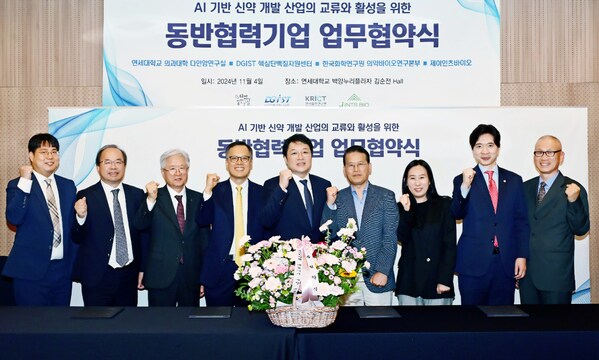– Yuhan Corporation CEO Wook Je Cho, National Assembly Member Seong Hoon Park, and KAIST Professor Joung Ho Kim join a pioneering collaboration in precision oncology.
SEOUL, South Korea, Nov. 5, 2024 /PRNewswire/ — On November 4, 2024, J INTS BIO hosted a significant MOU signing ceremony at Baekyangnuri Plaza, Yonsei University, unveiling a groundbreaking AI-driven collaboration to revolutionize cancer treatment. This ambitious alliance unites leading institutions, including Yonsei University College of Medicine’s DAAN Cancer Research Institute, Daegu Gyeongbuk Institute of Science and Technology (DGIST), Korea Research Institute of Chemical Technology (KRICT), and KAIST. The event featured a distinguished lineup, with Yuhan Corporation CEO Wook Je Cho, National Assembly Representative Seong Hoon Park, and KAIST’s Professor Joung Ho Kim, a prominent member of the National AI Committee, highlighting the extensive support from both government and industry sectors.

(Photo. From left) Professor Woo Kyung Yu of DGIST, Professor Joung Ho Kim of KAIST, CEO Wook Je Cho of Yuhan Corporation, Professor Byoung Chul Cho of Severance Hospital, Director Seong Kyoon Choi of DGIST, Director Kwang Rok Kim of KRICT, CEO Anna Jo of J INTS BIO, Seong Hoon Park of National Assembly Member, and Senior Researcher Gwang Ho Lee of KRICT
Precision Medicine Redefined: AI Meets Multi-Omics
J INTS BIO is at the forefront of developing personalized lung cancer therapies through the integration of artificial intelligence and multi-omics technology. Multi-omics offers a comprehensive approach to disease biology by combining genomics, transcriptomics, metabolomics, and proteomics. Using AI and national supercomputing infrastructure, the project aims to enhance drug efficacy prediction and minimize toxicity, addressing the critical challenges that plague conventional oncology drug development.
Professor Byoung Chul Cho of Severance Hospital, a key figure behind the development of the highly successful lung cancer drug “Leclaza,” emphasized, “AI is revolutionizing precision medicine. By employing AI and supercomputing, we can achieve ultra-precise analysis of patient tissue and genetic profiles, enabling the design of highly effective, personalized treatment strategies.” KAIST’s Professor Joung Ho Kim added, “AI’s capacity to process immense biological datasets and apply machine learning for patient-specific predictions can drastically reduce clinical trial failure rates and accelerate the entire drug discovery process.”
End-to-End Research Strategy: From Biopsies to AI-Optimized Therapies
The collaboration is structured around a comprehensive, four-phase research strategy: meticulous patient sample collection and preparation, AI-driven protein analysis using supercomputers, synthesis of drug candidates informed by AI insights, and rigorous clinical trials for validation.
The DAAN Cancer Research Institute at Yonsei University will lead the first phase, collecting lung cancer tissue and genomic samples and preparing them for AI model development. Using cell and animal models, the institute will validate AI predictions, identify drug resistance mechanisms, and refine algorithms to maximize accuracy.
DGIST’s Core Protein Resources Center will utilize national supercomputers to simulate protein-drug interactions, conducting high-precision structural analyses and virtual experiments. This work will confirm AI-driven hypotheses and facilitate the design of drugs tailored to the molecular characteristics of cancer.
KRICT’s Medicinal Bio Research Division will synthesize the AI-recommended drug candidates, subjecting them to thorough pharmacological and toxicological assessments. KRICT Director Kwang Rok Kim remarked, “AI is fundamentally transforming the landscape of drug discovery. It allows us to develop optimized therapeutic compounds faster and with greater safety, delivering unprecedented precision in medicine.”
J INTS BIO will oversee the entire project, managing clinical trials to validate AI-based predictions and develop clinically proven, patient-specific treatment protocols. This approach aims to expedite the path from laboratory research to market readiness, making advanced cancer therapies more accessible to patients worldwide.
A Game-Changer in Oncology: Government and Industry in Harmony
This collaboration marks a transformative leap in cancer research, showcasing the potential of merging AI with biotechnology. Seong-Kyoon Choi, Director of DGIST’s Core Protein Resources Center, stated, “AI and supercomputing together set a new standard for protein analysis and drug design precision. This partnership is poised to deliver groundbreaking advancements in cancer treatment.” National Assembly Member Seong Hoon Park underscored the national importance of this initiative: “The integration of AI and biotech is crucial for elevating South Korea’s global competitiveness in the bio-industry. The government will continue to provide unwavering support for these pioneering research efforts.”
Envisioning a future shaped by precision medicine, J INTS BIO and its partners aim to build extensive cancer data infrastructures, providing a solid foundation for ongoing research and innovation. The consortium plans to unveil interim results from the “AI-Supercomputing-Based Personalized Lung Cancer Therapy” project at a major international conference in the first half of next year, showcasing the project’s far-reaching impact and potential.

